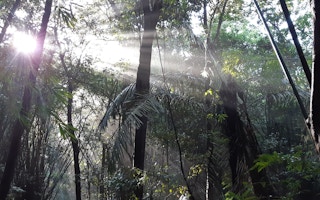In two weeks’ time, some of the biggest players worldwide in carbon markets and environmental conservation will arrive in Singapore to rally support for reinvigorating the offsetting business and nature-based projects.
To continue reading, subscribe to Eco‑Business.
There's something for everyone. We offer a range of subscription plans.
- Access our stories and receive our Insights Weekly newsletter with the free EB Member plan.
- Unlock unlimited access to our content and archive with EB Circle.
- Publish your content with EB Premium.
On invitation by Singapore’s state investor Temasek, two of the largest carbon project registries that cover the bulk of the corporate market, Verra and Gold Standard, will be fielding speakers at a flagship sustainability conference, with the latter sending down its chief executive from Switzerland.
They will be joined by executives from major industry watchdogs Voluntary Carbon Markets Integrity Initiative (VCMI) and Integrity Council for Voluntary Carbon Markets (ICVCM), along with project developers and international financial regulators.
One entire day – 16 April – out of three at Ecosperity Week will be dedicated to expositing the role of nature and private financing of carbon projects in fighting climate change. The other two days (15th and 17th) are focused on decarbonisation technologies and green financing.
The conference has generally reflected topics Singapore and its Asian neighbours are interested in. Nature-based solutions last got its thematic limelight in 2021, when carbon markets and prospects for forest conservation projects were booming as investors pledged a greener recovery from the Covid-19 pandemic.
The tone has shifted markedly this year, with a carbon market slump from economic headwinds and integrity allegations dragging on since early last year.
“We need to re-emphasise this topic now…[as] carbon markets are undergoing quite a lot of turbulence and challenges around the integrity of nature-based projects,” said Frederick Teo, chief executive of GenZero, a sustainability-focused investor owned by Temasek, who added that investors are moving away to avoid getting into “a public-relations problem”.
In 2023, major allegations that forest protection schemes had oversold carbon credits to corporate buyers claiming environmental gains caused a major pullout from the fast-growing market. Prices and trade have tanked since.
There is general consensus that protecting and planting forests is among the cheapest and easiest ways to decarbonise in the near term. But critics say that as market rules are currently written, black sheep developers have too much leeway to forge calculations and raise their own earnings.
“If the outcome [of scrutiny] is that people start to withdraw from investing into nature, are we in a better place, as a planet, as a community, as an ecosystem? We don’t know. The way we want to frame this narrative is to acknowledge that there are problems, things are not perfect, but how do we invest to better perfect an imperfect situation?” Teo said, speaking at a media briefing for Ecosperity Week.
At the conference, panellists will speak about why it makes scientific and business sense to invest in nature. They will discuss ways to support high-quality offsetting projects, and how firms can best navigate growing requirements for nature-related financial disclosures.
“We simply thought it would not be wise to ignore, to not have a focus on nature,” said Keith Lin, director of Temasek’s Ecosperity programme office.
“It is very much in line with global developments that correlate the decarbonisation and nature agenda as they evolve,” Lin said, pointing to the advent of corporate nature-related risk reporting initiatives that compel businesses to incorporate biodiversity protection into decision-making.
Singapore itself is deeply involved in the international carbon market. The city-state is pursuing bilateral deals, while allowing heavy polluters to offset part of their carbon tax dues with global carbon credits. Its key financial institutions set up a nature-focused carbon exchange, Climate Impact X (CIX), in 2021, first in Southeast Asia and still one the most successful ventures of its kind in the region.
But the country’s involvement also exposes it to market headwinds. Nature-based carbon prices on CIX have tanked. Its chief executive, who will speak at Ecosperity Week, has announced he intends to retire once a successor is found.
Market players are looking forward to a slew of measures this year that could return trust into the ecosystem. Verra has planned revamps for its under-fire rules on how project developers should craft forest protection and rice paddy management initiatives. The ICVCM will soon dish out certifications for carbon crediting programmes that pass its quality check.
Still, ground-up efforts should not be overlooked, according to Dr Lahiru Wijedasa, Asia forest coordinator at nonprofit BirdLife International, and a member of the Southeast Asia Climate and Nature-based Solutions (SCeNe) coalition.
Wijedasa said while there is a good line-up of speakers at Ecosperity Week, there should also be space for project developers, advocacy groups and governments in the region to showcase their work.
“In conferences like this, what gets presented is what’s happening at the top, not the hard work of the people on the ground. If we show what is happening on the ground, there may be more understanding from the public on [the value of] carbon markets,” he said.
“Good policy alone does not solve the issues around [rebuilding] market confidence,” Wijedasa added.










